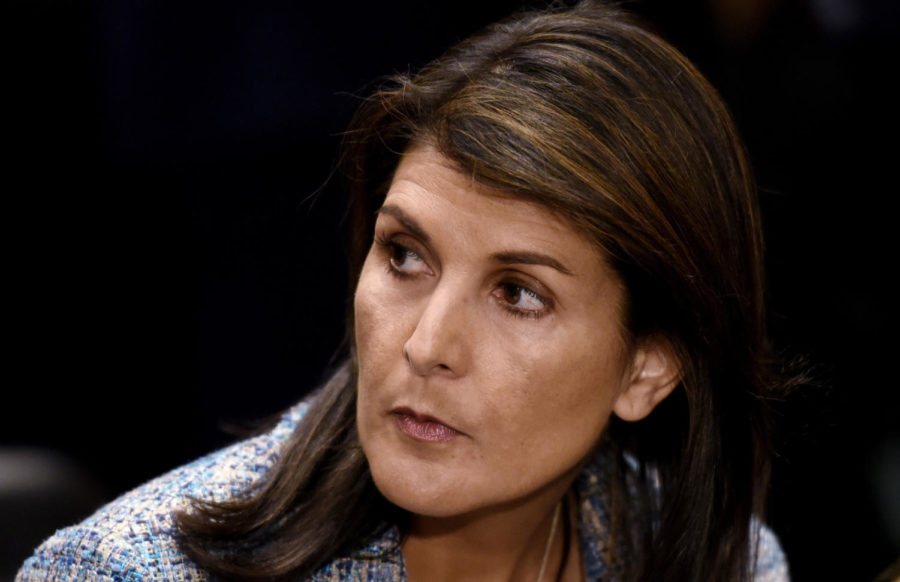Help wanted: Haley’s exit leaves White House without one of its best messengers
U.N. ambassador Nikki Haley attends Mike Pompeo’s confirmation hearing before the Senate Foreign Relations Committee on April 12, 2018 in Washington, D.C. Haley has resigned, White House officials said. (Olivier Douliery/Abaca Press/TNS)
October 10, 2018
The departure of Nikki Haley, one of the most polished messengers of President Donald Trump’s policy, will leave a void in a chaotic White House where, after two turbulent years, few officials remain who are trusted by Republicans of all stripes.
Haley, the former governor of South Carolina who has served as ambassador to the United Nations, quickly emerged as one of Trump’s most effective administration officials as other established Republicans and seasoned government officials left a White House consumed with non-stop controversies.
“Nikki Haley was a voice for moral clarity in a world that badly needs it,” said Matt Moore, the former chairman of the South Carolina Republican Party. “I hope the administration can find someone with her level of skill.”
Scott Jennings, political director for former President George W. Bush who is close to the Trump White House, said Haley was one of the people that could appeal to Bush Republicans, Trump Republicans, moderates, conservatives — “all the different layers, flavors and genres of Republicans.”
She was one of the few members of Trump’s Cabinet who didn’t alienate Democrats.
“I have an awful lot of concerns about the administration’s positions and everything the administration has done foreign policy-wise,” Rep. Karen Bass of California, top Democrat on the House Foreign Affairs subcommittee on Africa, told McClatchy last year. “With her, I did not feel those concerns.”
Haley, who plans to enter the private sector at the end of this year after more than a dozen years in government in South Carolina and Washington, will be a much sought-after surrogate on the campaign trail for candidates up and down the ticket — including Trump, who is seeking re-election in 2020.
Haley has at least $1.5 million in debts, according to her most recent financial disclosure report.
And as the daughter of Indian immigrants, Haley also was one of the most prominent women in the administration as well as one of the most high-profile minorities.
“Anytime you remove one of your best communicators … .it leaves a hole,” Jennings said.
On Tuesday, Trump and Haley sat side-by-side in the Oval Office before the television cameras to announce Haley’s resignation.
“She’s done a fantastic job and we’ve done a fantastic job together,” Trump said. “We’re all happy for you in one way, but we hate to lose you.”
She penned a resignation later to Trump dated Oct. 3 and had told him six months ago she wanted a break from her job. She also said she’d planned to leave her post after two years. Still, the announcement took White House officials by surprise.
Haley appeared to be at the top of her game. She is a frequent guest on TV news programs and has garnered more public attention than most Cabinet secretaries. She is often mentioned as a possible running mate to Vice President Mike Pence if he runs for president in 2024 — or as a possible presidential contender herself.
Since her start in the administration, however, some White House aides have grumbled that Haley has repeatedly either gotten in front of Trump or taken the spotlight away from him. She has also not hesitated to break from the president if and when she saw a need.
Just a few weeks ago, some in the White House were angered that Haley wrote a rebuttal to the anonymous New York Times op-ed describing how some officials work to stymie some of Trump’s ideas.
Her resignation comes as Citizens for Responsibility and Ethics, a government watchdog group, filed a complaint alleging she undervalued flights to South Carolina by tens of thousands of dollars on her annual financial disclosure form required of federal officials.
On Tuesday, Haley made a point to show she is leaving on her own terms. Few, if any, other departures from the Trump Cabinet have included a meeting before the television cameras to show the public there is no ill will. Former Secretary of State Rex Tillerson, whose disdain for the spotlight created a void for Haley to fill in the early months of the Trump administration, reportedly found out he was being fired through a presidential tweet.
Trump told reporters Haley could rejoin the administration at any time, and some Republicans immediately began to speculate she could serve as secretary of State in a second term.
“I’ll never truly step aside from fighting for our country,” she said.
Before she became a politician she was an accountant, giving her a businesswoman’s sensibility. When she was going through confirmation proceedings to become U.N. ambassador, she said she would approach running the agency as she did running a state. Being governor, she explained, taught her how to be efficient, use skills of diplomacy and advocate on behalf of a region’s interest.
Rob Godfrey, a senior aide to Haley when she was governor, said Haley can do whatever she wants now. “She has always been someone who combines private sector and public service experience,” he said.
Haley has made it clear she won’t be running for any elected office in 2020, either for president or for Senate when Republican U.S. Sen. Lindsey Graham is up for re-election.
Trump tapped Haley as ambassador to the U.N. soon after he won in 2016. It was a surprising choice given that she supported his rival, Florida Sen. Marco Rubio, during the Republican primary for president and was a frequent critic of then-candidate Trump’s inflammatory rhetoric.
She also had little foreign policy experience except for her regular overseas trips to woo foreign businesses to make investments in South Carolina.
Her decision to enter the unpredictable, volatile Trump administration rather than finish her term as governor was seen as a bid to bolster her portfolio and increase her exposure ahead of a campaign for the White House.
She was able to avoid drama in a way that many other Trump administration officials could not. Her entry into the administration did not include major obstacles. While other Trump Cabinet nominees were grilled by Democrats during their confirmation hearings for their lack of expertise in their respective areas, few Democrats quibbled with Haley’s credentials.
Her policy legacy at the U.N. will be controversial in some circles. She was unrelenting pursuit of streamlining the agency’s bureaucracy, boasting budget cuts many saw as detrimental to the organization’s ability to do basic functions. She came into the job promising to “take names” of other countries unfriendly to U.S. interests and later withdrew from the U.N. Human Rights Council, calling it a corrupt entity. And she took a strong pro-Israel stance as U.N. ambassador, refusing to adopt more politically-correct rhetoric about a two-state solution with Palestine.
While these gestures might have rankled critics, she won over Democrats as well as Republicans by standing out as a member of the administration most willing to articulate the country’s moral compass. Few other Cabinet officials have endeared themselves across party lines.
Sen. Robert Menendez of New Jersey, the top Democrat on the Senate Foreign Relations Committee, said in a statement Haley’s departure would create a “leadership vacuum.”
“I am deeply concerned about … the national security impact of her departure at this time of continued disarray for this administration.”



